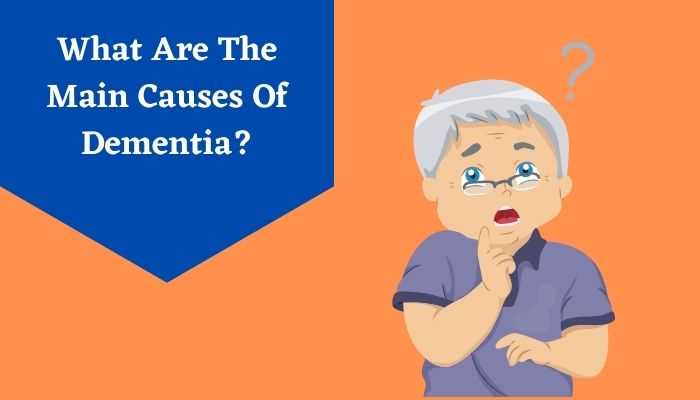Dementia is a form of disorder in the brain that persistently or chronically affects all mental processes. It is usually caused by an injury to the brain or nerve cells due to a trauma of any sort.
Dementia is quite visibly recognizable when it comes to symptoms. You will observe changes in personality and the ability to process information or remember things. Patients suffering from dementia causes will often display impaired reasoning in a lot of cases.
Dementia causes often interfere with daily functions by destroying the nerve cells that are responsible for social interactions and mental processing of complex information. Unfortunately, dementia causes often result in memory losses and impaired judgment, which is why it is important to seek dementia treatment at the earliest. In some cases, the effects of dementia can be minimized to a large extent with appropriate dementia treatment.
Top 8 Dementia Symptoms to Look Out For
Several symptoms are rooted in dementia causes that we will discuss soon. There are certain common dementia symptoms you can look out for and they are highly reliant on the cognitive and psychological causes.Here are the Cognitive changes that cause dementia symptoms:
- Evident loss of memory
- Difficulty in identifying or remembering words
- Uneasiness in visual and spatial reasoning, thus getting lost during a task
- Problems with reasoning and thinking of solutions.
- Difficulty when handling complex activities
- Difficulty when organizing or planning for certain events and activities
- Damaged motor functions that result in disoriented activities
- Problems with coordination
- Anxiety
- Depression
- Agitation
- Paranoia
- Inappropriate behavior
- Hallucinations
- Noticeable changes in personality
Top 9 Potential Causes of Dementia
Our brain is connected to certain nerve cells that transmit various information for movement and processing throughout the body. When these nerve cells are damaged, most of the information is not accurately transmitted. The cause of this damage can vary and based on the part of the nerve cells that are lost or damaged, the symptoms and effects of dementia can differ as well.Here are the causes of Progressive dementia:
Alzheimer’s Disease
The most commonly known cause of dementia is Alzheimer’s wherein the patient experiences mutation of three genes in the body that impairs important functionalities. The condition is hereditary for the most part and involves several genes but the Apolipoprotein E4 is the most significant factor.Vascular Dementia
As the name suggests, dementia from vascular malfunctions takes effect when the vessels that supply blood to your brain are somehow damaged or lose their ability to transmit.The loss of these important blood vessels and the limited blood supply results in the most common dementia symptoms such as loss of focus, inability in problem-solving, thinking slowly, etc.
Lewy Body Dementia
One of the common ad variant dementia causes that often affect people with Alzheimer’s, Parkinson’s, etc. is Lewy Body Dementia wherein the patient has proteins clumped in balloon-like structures.These clumps of protein often result in dementia symptoms involving visual hallucinations when conscious and in sleep. This dementia causes also displays other effects involving slower movements, disoriented coordination, etc.
Frontotemporal Dementia
In this form of dementia causes, the nerve cells in the temporal and frontal lobes break down, thus impairing their connection with the brain. As a result of these dementia causes, patients often experience problems with speech, display changes in behavior, and even in personality.Mixed dementia
People over the age of 80 who have previously suffered from dementia and related muscle disorders are likely to face problems with mixed dementia. This is mostly the case when a patient has previously suffered from Alzheimer’s Lewy Body dementia, vascular dementia, etc. in combinations at earlier life stages.Other disorders often lead to dementia. They are as follows:
Huntington’s Disease
There are dementia causes like in Huntington’s wherein between the ages of 30 to 40, the patient starts to display a rapid consequential decline in cognitive abilities. This is due to the nerve cells wasting away in the spinal cord ad brain.Traumatic Brain Injury
A common cause of dementia symptoms is repetitive trauma that destroys parts of the brain and the nerve cells in crucial regions of the body. These dementia cases involve traumatic brain injury is often found in athletes with physical contact on the field, soldiers, and others who are exposed to head trauma frequently.Creutzfeld-Jakob disease
One of the most dangerous dementia causes is CZJ, which becomes visible after the age of 60. A patient suffering from this particular disorder often experiences deposits of proteins called highly infectious Prions.CZJ is fatal ad inherited for the most part. It is also possible to contract it as a result of contact with a diseased brain.
Parkinson’s Disease
Parkinson’s is the most commonly known factor that leads to dementia symptoms. It is often referred to as Parkinson’s disease dementia.Several conditions resemble dementia but can be easily reversed. They are:
- Immune disorders and infections
- Endocrine abnormalities and metabolic problems
- Deficiencies in nutrition
- Side effects of certain medications
- Subdural hematomas
- Tumors in the brain
- Normal-pressure hydrocephalus
Medications & Treatment for Dementia
The dementia treatments are coherently reliant on the dementia causes. Several indications can be easily treated with the help of therapy, however, there are also severe cases of dementia caused by loss or impairment of nerve cells that require more extensive dementia treatment, especially involving dementia medications.The dementia medications prescribed are thoroughly designed to assist with the patient’s primary dementia syndrome. The dementia treatments mostly involve using drugs to enhance cognitive abilities and improve the blood flow to the brain.
Some dementia medications also help regulate the patient’s mood and blood pressure levels. It is best to seek professional help for dementia treatments based on a thorough diagnosis of dementia causes and symptoms, so if you or a loved one have the dementia symptoms, speak to a medical professional at the earliest.


